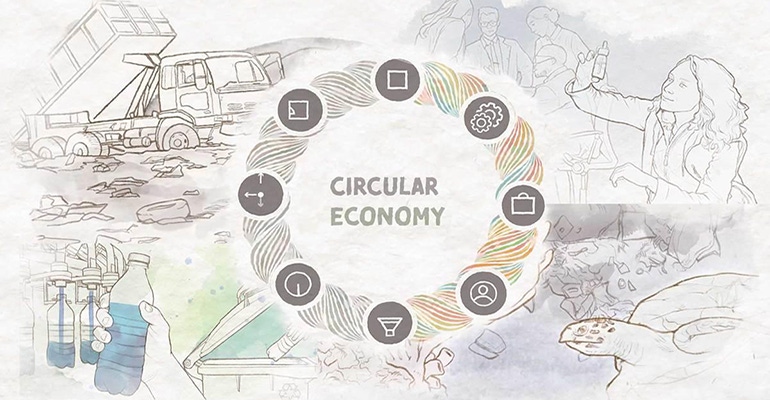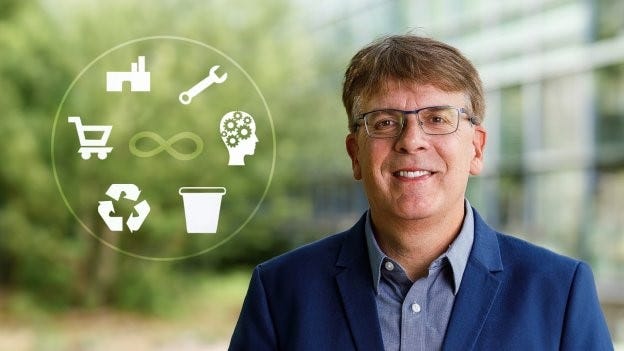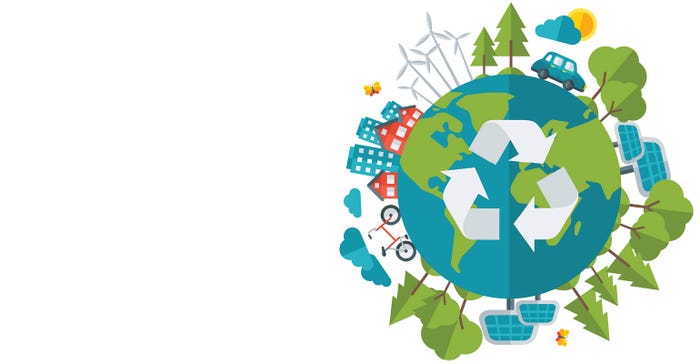US Funds Curriculum on Circular Plastic Economy
Arizona State University details how it will use a $500,000 education award from the US National Institute of Standards and Technology.
August 9, 2023

The US National Institute of Standards and Technology (NIST) last September announced plans to award each of five universities $500,000 from the NIST TIPC Grant Program to be spent over three years. The select group included Arizona State University, which planned to create seven curriculum modules that can be used to support a new certificate or degree in sustainable macromolecular materials and manufacturing.
ASU has revealed the specifics of the university's new curriculum for plastics circularity.
A multidisciplinary team of researchers from the Ira A. Fulton Schools of Engineering and the W.P. Carey School of Business at ASU, along with a collaborator at Virginia Tech, are taking on the challenge of developing a course to train the next generation of environmental sustainability leaders.
To cover the wide variety of topics integral to economic circularity, the year-long course consists of modules taught by experts in a range of fields. The team is led by Tim Long, a professor of chemical engineering in the Fulton Schools and director of ASU’s Biodesign Center for Sustainable Macromolecular Materials and Manufacturing, or SM3. Shown below, Long is also jointly appointed in the ASU School of Molecular Sciences.

Kevin Dooley, a distinguished professor of supply chain management in the W.P. Carey School of Business, will lead a module on supply chain management, using his experience working with more than 100 of the world’s largest retailers and manufacturers to develop tools that measure and track progress on critical product sustainability challenges.
Jennifer Russell, an assistant professor in Virginia Tech’s Sustainable Biomaterials division, is an expert in materials flow within economic consumption and production systems. Her module will arm students with strategies for integrating circular economic systems and practices in sustainable biomaterials.
Jay Oswald, a Fulton Schools associate professor of mechanical engineering, will use his expertise in computational modeling of the mechanics of materials to teach a module focused on the optimization of sustainable manufacturing processes.
Chemical engineers contribute to the circular plastics economy curriculum.
The team is rounded out by a group of ASU chemical engineers, including Associate Professor Matthew Green and assistant professors Renxuan Xie, Chris Muhich, Eileen Seo and Kailong Jin.
In preparation for teaching her module of the course, Seo joined the Engineering for One Planet fellowship, an initiative to better inform educators on ways to incorporate sustainability into their curriculum. Seo’s section of the course will explore strategies to develop composite materials capable of using phase change properties to degrade materials like plastic.
“I’ve been using this framework to design my course module to include critical thinking, design and material selection — everything that has to do with sustainability,” Seo says. “So instead of thinking about how we can deal with a material that is already made, we will focus on how we design materials with sustainability in mind from the beginning.”
Jin, who has expertise in thin film materials, will present students with strategies to develop degradable packaging plastics designed with gas barrier properties.
“Part of our mission is to develop what we call a transportable curriculum,” Long says, “a curriculum that could be shared with a community college, a university in a rural area or a university in an urban area. We want to develop these course modules and make them available as a model for other universities to adopt. This adoption would represent a major success for the program. Any one of the modules can be plucked out of the curriculum and inserted into their own programs.”
Modules will begin with a lecture focus and then transition to lab work giving undergraduate and graduate students hands-on opportunities to work with the latest technology to help them understand next-generation tools they can use to catalyze a circular plastic economy.
Unconventional thinking requires unconventional technologies.
A portion of the project funding will be used to install new instrumentations, termed sustainability tools, at ASU’s Biodesign Institute SM3 center where the course will be based.
Long emphasizes the importance of accessibility to the technologies being used to improve circularity.
“Our goal is to train the next sustainability leaders in the workforce,” Long says. “To do that, we need novel tools, tools that you wouldn’t normally expect. We want to develop an affordable tool that could find its way to a municipal landfill, or it could find its way to a university that doesn’t have the resources to purchase current, highly priced, more sophisticated instruments.”
“Part of the goal is not only to put nonconventional tools next to conventional tools, but also to design new tools that are transportable and more inclusive in terms of their impact,” Long adds.
Students will help to develop these tools and experiments to measure properties such as degradation rates, gas permeability and waste stream separations. They will also learn to analyze and present their results.
“We can also use these instruments for our own research,” Jin says. “So, it’s a win-win for research and education.”
Developing a circular economy is essential to the health of the planet, and public interest has put pressure on industry to develop solutions. Jin points out that companies and universities alike are seeking sustainability experts for a variety of reasons.
“Right now, sustainability is a real focus with a lot of companies. Many are setting goals to be carbon neutral by a certain date, and plastic circularity is certainly one of the criteria,” Jin says. “When graduate students complete their doctoral or master’s degree, they are expected to walk in and join the research and development team within a company. They are the future of the company, driving the innovation of materials.”

Course is appropriate for any students interested in sustainability.
Since the challenge of developing a circular economy requires changes to each step of manufacturing, Long sees this course as a fit for a student in any academic discipline who is interested in sustainability.
“Eventually, any student at the university could take this course, like students from the business school who are experts in supply chain analysis, circular economy, lifecycle analysis and techno-economic analysis,” Long says. “We need those kinds of students working right next to engineers. We also need social scientists involved in the course to foster discussion and partnerships that are so important to achieve a circular plastics economy. I can’t think of any student that won’t be welcomed to the course.”
The development of the course supersedes the group’s National Science Foundation Research Traineeship Program proposal focused on sustainable polymer development. The program is dedicated to the effective training of STEM graduate and undergraduate students in interdisciplinary or convergent research areas and provides funding to develop an innovative traineeship model that addresses future workforce and research needs.
This traineeship opportunity enables graduate students to conduct interdisciplinary research in an applied setting to create tangible, efficient solutions.
Long sees this NIST-funded course as just the beginning for expanding degree offerings within the Biodesign Institute for students of any discipline.
“Our vision is to create a new educational model. First, developing the curriculum, ensuring our courses do what we hope that they do; and then moving towards a sustainable polymer certificate; then, ultimately, moving toward a degree program,” Long says.
“That’s our goal: to create opportunities for students to study this now, both in person and virtually so that we are as inclusive as possible. I think ASU will then quickly emerge as a top-five university in sustainable macromolecular science and engineering.”
Other universities to receive $500,000 awards included…
Pittsburg State University in Pittsburg, KS, which will update and improve its plastics engineering technology degree program with lecture-based and hands-on laboratory learning modules focused on plastics circularity in the materials, design, and processing phases of production.
The University of Massachusetts at Lowell, which will develop case study modules for undergraduate and graduate students in its Plastics Engineering Department and transfer those into parallel curricula in the Mechanical Engineering, Chemical Engineering and Chemistry Departments. This effort will test transferability to related fields and assess the potential for expansion to other fields such as materials science and engineering.
The University of Missouri, Kansas City, which will develop interdisciplinary course curricula in plastics circularity, with three different courses in the Division of Energy, Matter and Systems. These will include a critical thinking course, a research skill training course and a polymer characterization lab course.
The University of Southern California, which will create a multidisciplinary minor in plastics circularity that will be available to anyone acquiring major degrees in chemistry, chemical engineering, environmental engineering, environmental science or business/entrepreneurship. This project will also create a summer school targeting community college and primarily undergraduate serving institutions.
You May Also Like


